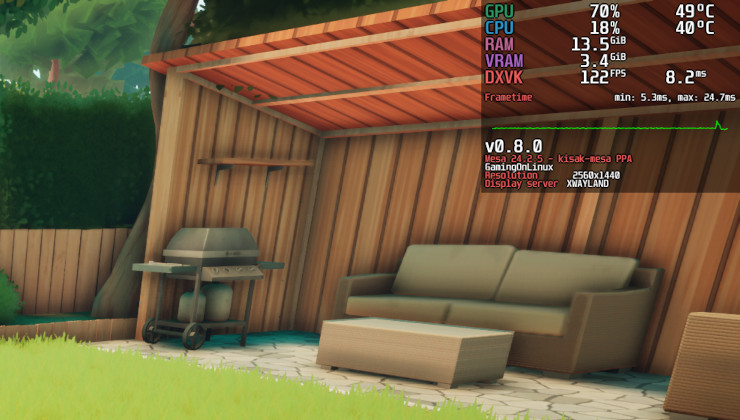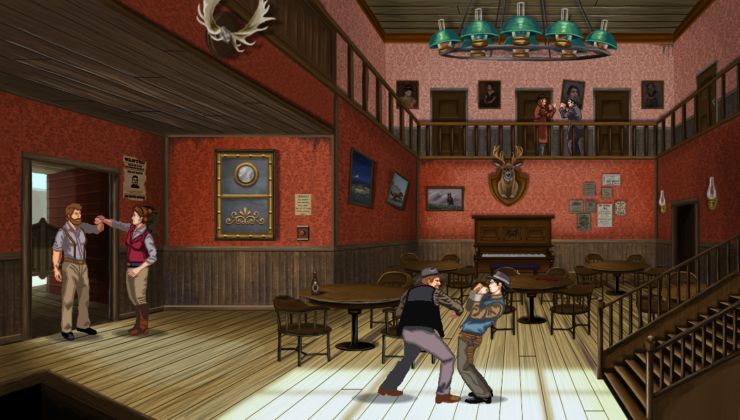There's apparently absolutely no stopping the Blender train, with the developer announcing that Apple has now joined their development fund.
The Blender Foundation, the organization behind the popular open source 3D creation tool “Blender”, today announced that Apple has joined the Blender Development Fund as a Patron Member to support continued core development for Blender.
Alongside a contribution to the Development Fund, Apple will provide engineering expertise and additional resources to the Blender HQ and development community to help support Blender artists and developers.
According to the Twitter post they're a "corporate Patron", meaning they're giving at least €120,000 a year to the Blender team to help keep it going. It's not clear how up to date their funding page is but as of when it was last updated, Blender gets at least €144,704 a month from various sponsors.
With Apple in they join the likes of AWS, Unity, AMD, Epic, NVIDIA, Facebook, Microsoft, Adobe, Intel and many more in keeping this excellent free and open source project alive and well.
2022 is going to be even better. Blender 3.0 is shaping up to be a great update, with a huge focus on performance improvements for just about every aspect of Blender. Shortly after it comes out, early 2022, the next update is meant to include a rework for Eevee as well, and some great new enhancements are planned like screenspace global illumination and eventually, likely, possibly, real time raytracing.
Blender is OP!
Well, good for Blender and open source in general!
Of course with Blender you could always count on other companies funding it enough for it to be useful enough that you could keep most employees using it.
It has to hurt for Apple to do that. It basically says "Yes, Apple doesn't have anything that can compete with this even though it's a core kind of software for Mac users, so we have to act like we're happy about something outside our walled garden succeeding. Isn't it bad enough we don't control Photoshop?"
My thoughts exactly, you couldn't have said it better, lol
There's a LOT of open source projects out there that are used by large corporations. Many of whom also have large commercial competitors.
It's not too say I imagine this is the only oss that's supported out there, that's far from the truth, but Why do blender enjoy this massive, very wide support?
Last edited by Beamboom on 16 Oct 2021 at 7:17 am UTC
It begs the question... Why? What's in it for them? And that goes for all of them. What's the motivation behind it?
There's a LOT of open source projects out there that are used by large corporations. Many of whom also have large commercial competitors.
It's not too say I imagine this is the only oss that's supported out there, that's far from the truth, but Why do blender enjoy this massive, very wide support?
I do suppose that partially because Blender itself bas a strategy from the beginning to get money from different organisation. There are many OSS software where there is not clear path for subventions nor company patron.
It begs the question... Why? What's in it for them? And that goes for all of them. What's the motivation behind it?
There's a LOT of open source projects out there that are used by large corporations. Many of whom also have large commercial competitors.
It's not too say I imagine this is the only oss that's supported out there, that's far from the truth, but Why do blender enjoy this massive, very wide support?
I do suppose that partially because Blender itself bas a strategy from the beginning to get money from different organisation. There are many OSS software where there is not clear path for subventions nor company patron.
Blender actually started as closed source, transitioned to freeware and was gone for a while due bankruptcy until it was resurrected as open source. I would suppose there could have been wish that Blender would be great if there would be money to keep developing it. So securing the funding must have been important right from start of the open source journey.
Blender Foundation also has grandiose plans. They have been doing short film projects specific improvements to Blender in mind and again and again proven that Blender can be used in animation projects that actually look good. There's list of several short films at https://en.wikipedia.org/wiki/Blender_Foundation#Open_projects. I think most if not all should have source files available somewhere.
I do suppose that partially because Blender itself bas a strategy from the beginning to get money from different organisation. There are many OSS software where there is not clear path for subventions nor company patron.That's a really interesting point you're making there.
But it never happens the other way, that I've ever seen. Once a category's lead offering is open source, that's it, closed has lost. Sometimes something new will displace it, but if so that new thing will also be open source, sometimes a fork of the old thing. Closed source commercial software never displaces open source category leaders.
Thinking about Blender just made me realize something: When a category of software is dominated by closed, commercial software, sometimes an open source offering will catch up, gain mind share, and replace the main closed offerings as the standard.
But it never happens the other way, that I've ever seen. Once a category's lead offering is open source, that's it, closed has lost. Sometimes something new will displace it, but if so that new thing will also be open source, sometimes a fork of the old thing. Closed source commercial software never displaces open source category leaders.
How it could happen is when popular open source program switches to open core of full closed source model. Also code under non copyleft open source licenses can be integrated into closed source programs (especially BSD and alike have practically that option).
Market will try to fix the former, latter is bit more muddy. In former forking works. In latter case you can keep using the original project just fine, closed source side is the fork. Being burned by vendor lock-in makes it harder to switch to closed source side in either case. Some people might get shivers just by thinking about Microsoft or Oracle.
Once the closed source programs lose their market share, it's hard to gain market share with new closed source program. Most extreme case is something like browsers where best way gain good niche is to build on top on Chromium. Building something from scratch is just too much work. With Blender we're maybe not there just yet.
Thinking about Blender just made me realize something: When a category of software is dominated by closed, commercial software, sometimes an open source offering will catch up, gain mind share, and replace the main closed offerings as the standard.
But it never happens the other way, that I've ever seen. Once a category's lead offering is open source, that's it, closed has lost. Sometimes something new will displace it, but if so that new thing will also be open source, sometimes a fork of the old thing. Closed source commercial software never displaces open source category leaders.
I agree wholeheartedly.
I was talking to someone about this a month ago and I gave them an metaphor.
"Open source vs closed source software..
.. is like a fight to the death between an invincible snail, and a fierce lion.
As fierce as the lion may be, it can't actually win. Because the snail can't lose.
The snail will always eventually win, even if it takes a while."
That's why I remain convinced that one day Linux will overtake Windows on PCs. It's a matter of time.
.. might be a matter of a hell of a lot of time, but still, just a matter of time.
Open source never dies. It can't. Unlike a business, it doesn't have the same concerns of profitability to worry about. Closed source absolutely can lose and does. Blender had all the time in the world to slowly refine itself, grow as a community, improve, etc. It didn't have to remain a viable business like Autodesk the entire time. It could just quietly and slowly chip away at the beasts. If Blender Foundation collapsed, it could be reborn under a new name with new people. People can leave, donations can dry up, but the software is open source and "yours forever".
Now it's like a screaming freight train in the night, absolutely unstoppable. What hope does Autodesk have in the long term against a competitor that costs nothing and which users and corporations are willingly giving money to? And which has shown, will eventually catch up on all areas of weakness.
Last edited by gradyvuckovic on 19 Oct 2021 at 2:10 am UTC









 How to set, change and reset your SteamOS / Steam Deck desktop sudo password
How to set, change and reset your SteamOS / Steam Deck desktop sudo password How to set up Decky Loader on Steam Deck / SteamOS for easy plugins
How to set up Decky Loader on Steam Deck / SteamOS for easy plugins
See more from me